Love in the Afternoon Blu-ray Movie
HomeLove in the Afternoon Blu-ray Movie 
Warner Archive CollectionWarner Bros. | 1957 | 130 min | Not rated | Feb 07, 2017
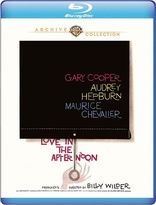
Movie rating
6.9 | / 10 |
Blu-ray rating
| Users | 4.2 | |
| Reviewer | 3.0 | |
| Overall | 3.0 |
Overview
Love in the Afternoon (1957)
An aging American tycoon overcomes his inhibitions to court a young Parisian.
Starring: Gary Cooper, Audrey Hepburn, Maurice Chevalier, John McGiver, Van DoudeNarrator: Louis Jourdan
Director: Billy Wilder
| Romance | Uncertain |
| Drama | Uncertain |
| Comedy | Uncertain |
Specifications
Video
Video codec: MPEG-4 AVC
Video resolution: 1080p
Aspect ratio: 1.78:1
Original aspect ratio: 1.85:1
Audio
English: DTS-HD Master Audio 2.0 Mono (48kHz, 24-bit)
Subtitles
English SDH
Discs
Blu-ray Disc
Single disc (1 BD)
Playback
Region A, B (C untested)
Review
Rating summary
| Movie | 2.5 | |
| Video | 4.5 | |
| Audio | 4.0 | |
| Extras | 0.5 | |
| Overall | 3.0 |
Love in the Afternoon Blu-ray Movie Review
Paris When It Fizzles
Reviewed by Michael Reuben February 8, 2017Show business lore records a pointed exchange between directors Billy Wilder and William
Wyler at the funeral of Ernst Lubitsch, whose untimely death at the age of 55 deprived cinema of
one of its comedy geniuses. "No more Lubitsch!" lamented Wilder, for whom the director of To
Be or Not to Be and The Shop Around the Corner
had been a model and mentor. "Worse than that!" replied Wyler. "No more Lubitsch pictures!"
Ten years later, Wilder tried his hand at a
Lubitsch picture with Love in the Afternoon, pairing Gary Cooper and Audrey Hepburn as a
romantic couple just as unlikely as the scheming gigolo and severe Soviet envoy in Lubitsch's
Ninotchka. Like that earlier classic, Wilder's film
was also set in an elegant Parisian hotel
buzzing with amorous liaisons, and also like the earlier film, Love in the Afternoon surrounds its
featured couple with the slapstick antics of a troupe of supporting players.
Unfortunately for all concerned, Love was poorly received by both critics and American
audiences (although the reception in Europe was more favorable), and the blame has often been
unfairly placed on Gary Cooper, who, at 56, was deemed too old to be a credible romantic lead,
especially opposite the sprightly Hepburn, who was playing a character barely out of her teens.
Wilder's first choice, Cary Grant, had turned down the role for precisely that reason, and Cooper
was reportedly so stung by the mockery that he subjected himself to a facelift. However,
watching the film today, it's apparent that Love's problems run deeper than the ages of its star
couple. Wilder was a formidably talented filmmaker, but even he was unable to emulate the
famous "Lubitsch touch"—an indefinable but instantly recognizable magic that could find
comedy in Stalin's purges even while they were still happening. Love routinely reaches for
the style of Wilder's idol, but it only sporadically achieves the light tone of facetious mockery
that was Lubitsch's special gift. For too much of its overlong running time, the film just seems to
be idling, relying on Audrey Hepburn's charm to carry it. Meanwhile, the dry Gallic delivery of
secondary co-star Maurice Chevalier routinely steals the show.
Love in the Afternoon is the latest release from the Warner Archive Collection, which has done
its usual commendable work to bring this cinematic white elephant to Blu-ray.
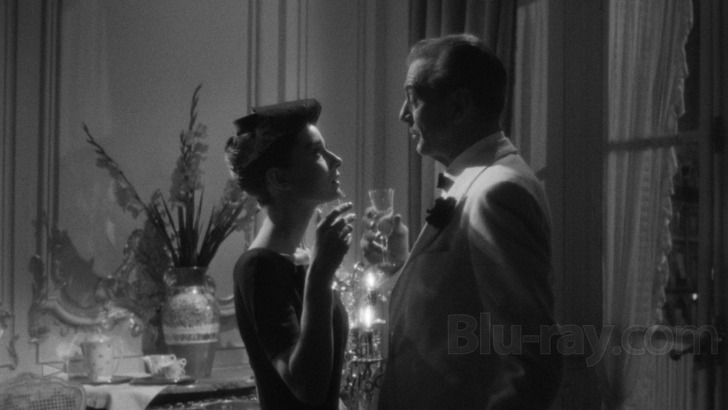
Love in the Afternoon is narrated by Claude Chavasse (Chevalier), a cheerfully cynical Parisian P.I., who specializes in matrimonial work. A regular stimulus to his business is American magnate Frank Flannagan (Cooper), who travels the world overseeing his business interests and romancing an array of women, heedless of their marital status. (Pepsi is one of Flannagan's major investments, and its then-current ad slogan, "Pepsi-Cola hits the spot!", is a running joke.) Currently Flannagan is entertaining the unnamed wife (Lise Bourdin) of a Paris businessman (John McGiver), whose suspicions have prompted him to hire Chavasse. When the detective presents Monsieur X with photographic proof of his wife's betrayal, the distraught husband announces his attention to shoot Flannagan dead—to the consternation of Chavasse's daughter, Ariane (Hepburn), who overhears the exchange from the next room, where she is practicing her cello.
Racing to the Hotel Ritz, Ariane interjects herself into the proceedings and narrowly averts a crisis. In the process, she attracts the interest of Flannagan, to whom she refuses to identify herself. He dubs her "thin girl", and a long (a very long) courtship begins, with Ariane routinely pretending to be a shady lady trailing a string of lovers. (She gets the details from her father's case files, which she's been reading on the sly.)
Chavasse is unsuspecting of his daughter's new-found interest. He thinks she spends her afternoons and evenings practicing and rehearsing at the conservatory, where fellow musician Michel (Van Doude) has an obvious crush to which Ariane remains oblivious. Her trysts with Flannagan are confined to the afternoons (hence the title), and Wilder remains coyly equivocal about just how much intimacy occurs during those hours. A line was added in post-production to reassure bluenoses that the relationship never became physical, but it's an obvious and ineffective fig leaf for an ambiguity that was clearly intended as a sexual tease. When Chavasse eventually learns of the relationship, he intervenes with a degree of calm that would seem almost unnatural in anyone but a jaded Frenchman. By that point, Flannagan has surprised himself by falling in love. Embarrassment and confusion are the only remaining barriers to a happy ending, but those are easily dispatched.
That's really all there is to Love in the Afternoon, but Wilder and co-writer I.A.L. Diamond (in the first of many collaborations) draw out the story to a length that is deadly to laughter. (Lubitsch would have known better.) The film's best parts are those that focus on players other than the lead couple, exploiting for laughs the scrambling of the hotel staff, the misadventures of a yappy dog owned by an imperious long-term guest (Olga Valery) and the deadpan reliability of the Gypsies, the musical quartet retained by Flannagan to serenade his conquests. Whenever Chevalier's Chavasse appears to comment on love's folly with the mocking detachment of someone who long ago abandoned such foolishness—he is, of course, a widower—the film briefly rises into the rarefied air where laughter erupts. Indeed, the single best sequence in Love is its opening, where Chavasse provides a guided tour of l'amour Parisienne, which is so infectious that it can break out even at a funeral. If Love had maintained the wry amusement of that initial sequence, it could have been a classic. Instead we're treated to strained interludes between two stars whose chemistry is less than electric and whose efforts at banter are sufficiently labored that the viewer has plenty of opportunity to reflect on just how unlikely their relationship really is.
Hepburn made Love in the Afternoon the same year as Funny Face, in which the age gap with leading man Fred Astaire was even greater, but Stanley Donen's musical gets away with the pairing for a number of reasons, not the least of which is that it's almost half an hour shorter. Suspension of disbelief is easier when the actors are singing, and an improbable pair is more acceptable when they dance instead of talking.
Love in the Afternoon Blu-ray Movie, Video Quality 
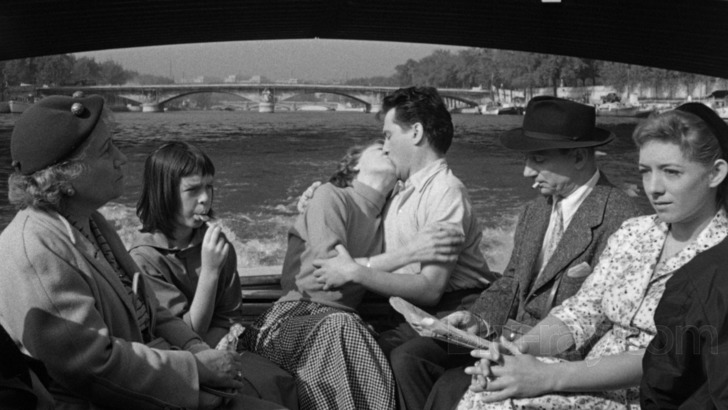
Love in the Afternoon was shot by William C. Mellor, who had already won an Oscar for the black-and-white photography of A Place in the Sun and would win another for The Diary of Anne Frank. For the Warner Archive Collection's 1080p, AVC-encoded Blu-ray, a fine-grain master positive recently struck from the original camera negative was scanned at 2K by Warner's Motion Picture Imaging facility, followed by the usual correction and cleanup. The result is a delicately textured image that effectively replicates the romantic sheen cast over the proceedings by Mellor's lighting, a kind of visual counterpoint to Chavasse's cynical narration. While the image is often soft—in some scenes more than others, depending on the light—detail is sufficiently reproduced to make the Parisian settings a suitable romantic background. Blacks are solidly rendered, and the different levels of black and finely delineated shades of gray help create a sense of depth. The film's grain pattern is well-resolved, and WAC has mastered the disc at its usual high average bitrate (here, 34.99 Mbps). With both production and post-production conducted in Europe, Love has a distinctively different look from Warner's typical B&W photography, and the Blu-ray represents it faithfully.
Love in the Afternoon Blu-ray Movie, Audio Quality 
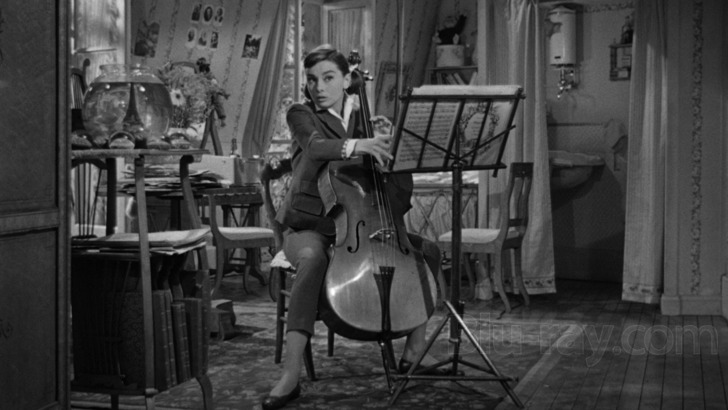
Love in the Afternoon's original mono soundtrack has been restored from surviving optical elements, cleaned of pops, clicks and other distortions, and encoded in lossless DTS-HD MA 2.0. It's a clearly articulated track with good fidelity, reproducing dialogue intelligibly and sound effects with the requisite emphasis. The musical score consists of selections both classical and modern, many of them played by Flannagan's "house" band, the Gypsies. An oft-repeated tune with special significance is "Fascination", an already familiar waltz that Wilder's film propelled to even greater popularity. The prelude from Wagner's Tristan and Isolde makes a guest appearance.
Love in the Afternoon Blu-ray Movie, Special Features and Extras 

The sole extra is the film's trailer (1080p; 1.78:1; 3:00), which has been remastered in 1080p. Warner's 2002 DVD of Love in the Afternoon was similarly bare.
Love in the Afternoon Blu-ray Movie, Overall Score and Recommendation 
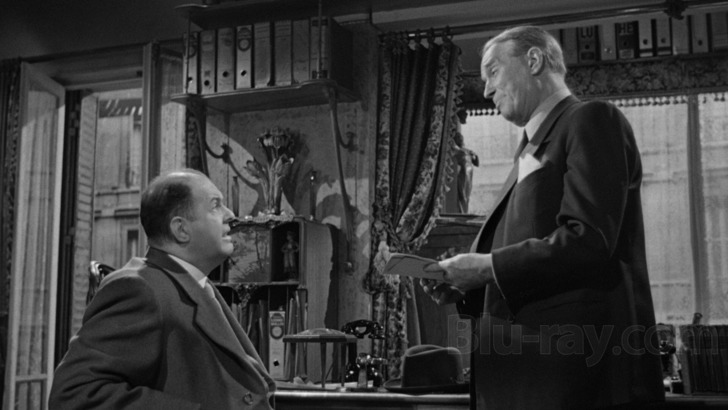
William Wyler had it right: With Lubitsch gone, there would be no more Lubitsch pictures. Love
in the Afternoon is a poor substitute, despite the talents of all concerned. While the film isn't a
highlight in anyone's filmography, WAC has brought it to Blu-ray with its usual care.
Recommended on its technical merits.
Similar titles
Similar titles you might also like

Gentlemen Prefer Blondes
1953

Madame Bovary
Warner Archive Collection
1949

The Secret Life of Walter Mitty
1947

Julie & Julia
2009

The Lady Eve
1941

Sabrina 4K
1954

Bluebeard's Eighth Wife
1938

Cover Girl
Limited Edition to 3000 - SOLD OUT
1944

The Only Game in Town
Limited Edition to 3000 - SOLD OUT
1970

Café Society
2016

The Facts of Life
1960

A Little Chaos
2014

At Middleton
2014

In Good Company
2004

Definitely, Maybe
2008

The Devil Wears Prada
10th Anniversary Edition
2006

Angel
1937

One Way Passage
Warner Archive Collection
1932

Remember the Night
1940

You're a Big Boy Now
Warner Archive Collection
1966